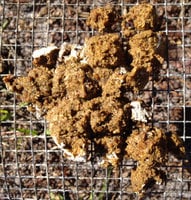RIR7jn
In the Brooder
- Dec 29, 2015
- 16
- 2
- 37
We need some help in figuring out what is moving through our flock. Some symptoms are the same, but not all. The first chicken we lost had these symptoms: red streaks in her legs, her legs were always cold, she started to always have messy poop, she lost a lot of weight, and she would keep her head tucked in, which made her crop push out. Then she died. The second chicken we lost did not lose any weight, but she started having that same mushy, messy poop. We separated her from the flock, and we put Corid in all the water. Her crop was extended and she was gurgling. So we "vomited" her, and a lot of dark brown, coffee colored liquid came pouring out of her. She wouldn't eat, even if I made the feed mushy. Her gurgling got worse and she had a lot of trouble breathing. We went to get an antibiotic for her and she passed before we got back. Now I have a third chicken with that same messy poop. She eats a lot, she seems normal, except for her poop. There's no solid poop in the coop from where she was roosting. Does anyone have any idea what could be going through our flock? I have not seen any worms in any of the poop, not even in the poop of the chickens that have died. And it seems to be slow -- the last chickens didn't die until about after a month from the time we began noticing the messy poop. Thanks in advance for any help!




 It can be a challenge to know what's going on with chickens, so a lot of times it's a process of elimination. Getting the fecal float will rule out worms and coccidiosis overload. Feel her abdomen for any swelling, bloat or feeling of fluid which might indicate a reproductive problem. Also while you are feeling her up, check through her feathers for any external parasites.
It can be a challenge to know what's going on with chickens, so a lot of times it's a process of elimination. Getting the fecal float will rule out worms and coccidiosis overload. Feel her abdomen for any swelling, bloat or feeling of fluid which might indicate a reproductive problem. Also while you are feeling her up, check through her feathers for any external parasites.
